中职英语基础模块上册unit1(完整版)
中职英语基础模块Unit 1
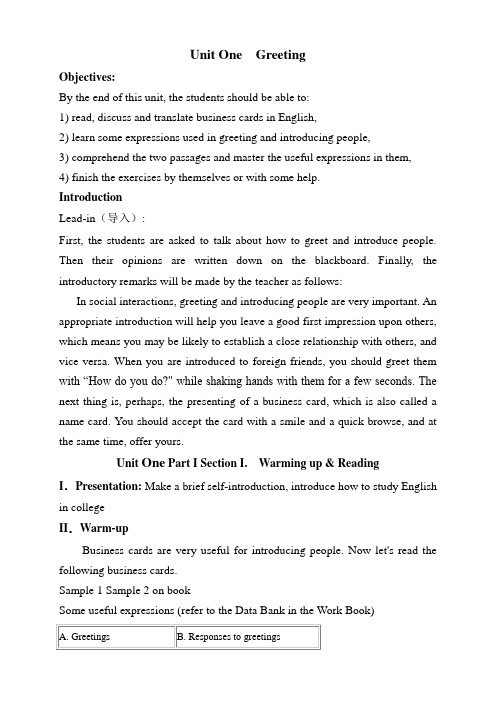
Unit One GreetingObjectives:By the end of this unit, the students should be able to:1) read, discuss and translate business cards in English,2) learn some expressions used in greeting and introducing people,3) comprehend the two passages and master the useful expressions in them,4) finish the exercises by themselves or with some help.IntroductionLead-in(导入):First, the students are asked to talk about how to greet and introduce people. Then their opinions are written down on the blackboard. Finally, the introductory remarks will be made by the teacher as follows:In social interactions, greeting and introducing people are very important. An appropriate introduction will help you leave a good first impression upon others, which means you may be likely to establish a close relationship with others, and vice versa. When you are introduced to foreign friends, you should greet them with “How do you do?" while shaking hands with them for a few seconds. The next thing is, perhaps, the presenting of a business card, which is also called a name card. You should accept the card with a smile and a quick browse, and at the same time, offer yours.Unit One Part I Section I. Warming up & Reading I.Presentation: Make a brief self-introduction, introduce how to study English in collegeII.Warm-upBusiness cards are very useful for introducing people. Now let's read the following business cards.Sample 1 Sample 2 on bookSome useful expressions (refer to the Data Bank in the Work Book)III.Read the passageAsk the students to skim the passage.IV.Analyze the passage, and explain the language points and difficult sentences.(In this step, some related information will be provided for the students.) Formation of Common English NamesA common English name is usually composed of two or three parts: the first name is also called forename. If the person is a Christian, his first name will be given at his baptism, so it is also called the given name or the Christian name. Middle name is the second given name. When written, middle name is often shortened to the initial letter. Surname is often the father’s family name, so it is also called family name or last name. For example: Anne Louise Strong, George W. Bush.Ask the students to skim the passage and answer the questions.①. What does an informal greeting really mean to Americans?②. Why don’t most Americans like using titles in introductions?③. What do your American friends want to show when they address you with your first name?④. Why do Americans ask you some personal questions?Analyze the passage, and explain the language points and difficult sentences(1) Explanation of Difficult Sentences①(Title) The Way American GreetAnalysis: In this title, "in which" is omitted after The Way.“in… way” means (to do something) by means of a certain method. Translation: 美国人的致意方式Example: I think the way she studies is worth studying.②(Para. 1) Speaking of …time, I’ve got to run.Analysis: "Speaking of" is a present participle clause used as an adverbial of cause/time. It means “when it comes to time, I’m reminded of …”Translation: 说到时间,我得赶紧跑了。
中职高教版英语1基础模块

a personal name cardanddescribetheoccupationof others.
教学内容题 目
职业岗位知识点、能力点
与基本职业素质点
目标水平
识记
理解
熟练操作
应用
分析
Readingand Writing
知识点:Masterthegrammar structure Verb“be”pronouns.
【主要教学内容】
Content:
the words about name card and vocation.eg:telephone number; age; address; e-mail address; job (engineer; manager; secretary; teacher; student; doctor; nurse; singer; fans); position(boss)
2)about greeting:Good to meet you.
3)about personal information:What’s you name Where are you from Which company are you from
designpersonalname card.
【主要能力点与知识点应达到的目标水平】
the meaning of“last name”and“first name”.
9. Read and underline. Practice the dialogue with your partner and underline the sentences aboutasking one’s personal information.
中职英语基础模块上册unit1PPT课件
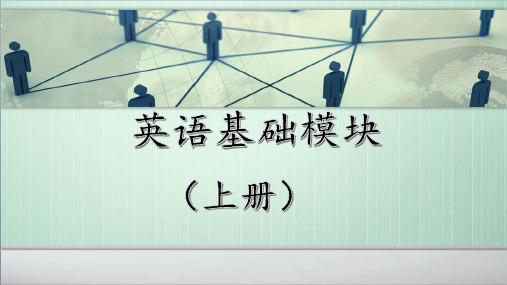
I'm fine,too.Tha
nk you! 我也是,谢谢
LOREM IPSUM DOLOR
Nice to meet you! 很高兴见到你 Nice to meet you,too! 也很高兴见到你
• Notes:
•
• 1. Introductions are important because a proper introduction will leave a good first impression upon others.
Between Acquaintances [ə´kweıntəns ]
Hello. Hi. How are you? How are you doing? How’s it going? What’s up? What’s new? Hi, there
How are you?
• Good, pretty good, great, fantastic, perfect • Not bad • So so • Not good • Bad, I am not in a good mood • I am in a blue mood • Terrible, awful
❖meet
❖ v.遇见;汇合;迎接
❖look
❖ v.看;瞧;看起来,显得
look at
看
❖class
❖ n.班级;课节
❖a lot of ❖ 许多+可数名词
例句:这有许多花。 eg. There are a lot of flowers.
❖read
❖ v.读;阅读
reading room 阅览室
例子:读书
nisi ut aliquip ex ea commodo consequat.
中职英语 基础模块1 Unit 1 Personal and Family Life
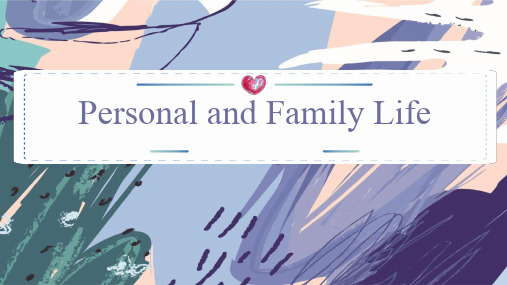
重点详解
1. family name given name Liu Xingting is a flight attendant.
Xinting is her given name. Xu Ming is a firefighter. Xu is his family name.
单词卡片 middle school student
younger sister
twin sisters especially
community
n.初中生 n.妹妹
n.孪生姐妹 adv.尤其是
n.社区
单词卡片 cook
Chongyang Festival handmade
family name delivery person
我的一名消防员,我的妻子是一名教师。
(2)He wants to work as a teacher in Western China. 他想在中国西部当一名教师。
重点详解
4.manage.v动词 manager.n 名词
英译汉: 1.He manages a department. 2.He is a manager.
n.厨师 重阳节 adj.手工的 n.姓 n.送货员
单词卡片 given name flight attendent firefighter vocational ancestor
n.名 n.空乘人员 n. 消防员 adj.职业的
n.祖先
单词卡片 address formal
situation
as for name after
little
三、选择题。
中职英语 基础模块1 Unit 1 Personal and Family Life
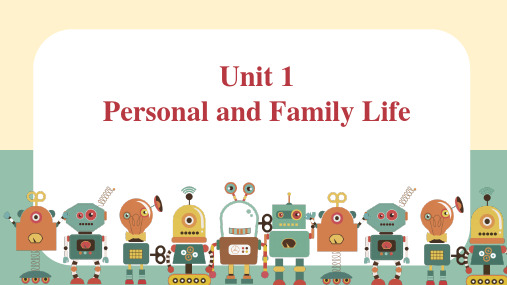
work as a teacher in Star Vocational(职
业的) High School.
记一记:记记交际语
交际语: Hello!My name is ...... . I'm...... . 你好!我的名字是.... 我是...(职业) Hi! My name is ...... . My family name is..... . 你好!我叫....。我姓.....。 Nice to meet you! My first name is... 很高兴见到你!我的名字是....。 Good morning/afternoon/evening! 早安!/午安! / 晚安! How do you do! 你好! I work as.... 我的工作是....
Smith Brown Brown
given name
first name (名字)
family name
last name (姓)
中国是姓在前名在后 西方是名在前姓在后
找一找:找出打招呼的英文表达
1. Hello! my name is Li Ting. I'm a
doctor. my family name is Li.
Words game
点击每个礼物,说出相应单词和释义
doctor
firefighter
delivery person
flight attendant
teacher
1. think and match. 将以下自我介绍与图中人物相匹配
52 3 4 1
1. Hello! my name is Li Ting. I'm a doctor. my family name is Li. 2. Hi! My name is Zhang Yifan. I'm a delivery person. Yi fan is my given name. 3. Nice to meet you! I'm Liu xinting. I'm a flight attendant. How can I help you? 4. Good morning!I'm Xu Ming, a firefighter. My given name is Ming means brightness. 5. Good afternoon! I'm Yu xinling. I work as a teacher in Star Vocational High School.
中职英语职业模块 unit01

call about the hardware
5. 4:20 p.m. ask the janitor to clean the
meeting room
英语(工科类)(职业模块)
5
Unit 1 Working Together
Listening & Speaking
Listening Dialogue Role Play Words and Expressions
英语(工科类)(职业模块)
15
Unit 1 Working Together
Reading & Writing
Reading 1 Reading 2 Writing
英语(工科类)(职业模块)
16
Unit 1 Working Together
Reading 1
Warm up Text A Words and Expressions Read and fill Read and think
6. Every company has its own style and pace for doing work. Pace your work to that of your fellow employees.
Note that any of this advice has almost nothing to do with the job itself or the skills, training and experience you bring to it. That’s usually the easy part of any new job.
英语(工科类)(职业模块)
22
Unit 1 Working Together
中职英语基础模块上册unit1(完整版)

a pat on the back
a hug
拥抱:在欧美、中东及南美洲常见的礼节, 一般用于熟人和朋友之间,有时伴随着接吻礼, 是比较亲密的一种见面礼仪。这种礼仪一般用 于同性或者亲密的异性之间。
1.w_______ (欢迎) 2. v _______ (职业的) 3. g_______ (高兴的) 4. m________(遇见,汇合,迎接) 5. l______(看,瞧,看起来,显得... ) 6. c______ (教室) 7. b________ (建筑物,楼房) 8. l________ (实验室) 9. f_____(楼层,地板) 10. l________ (大的) 11. b_______ (明亮的) 12. c__(班级,课节)
❖every
❖ adj. 每一个;每个
❖love
❖ v.热爱;爱好
❖hard
❖ adv.努力地;adj.硬的;难的
❖thank
❖ v./n.感谢
thank …for… 为…而感谢…
例句:谢谢你的帮助。eg. Thank you for your help.
❖visit ❖time ❖English ❖want ❖desk ❖chair
a bow
鞠躬:日本是一个极其注重礼节的国家,见面时一般 都要互相问候,脱帽鞠躬,眼睛向下,表示诚恳的态度。 日本妇女温柔体贴,每天鞠躬无数次,对男子亦十分尊 重。除了日本之外,朝鲜人见面也行鞠躬礼。
a kiss on the cheek
接吻礼:接吻礼是西欧流行在亲人、朋友、夫妻之间的 亲昵礼节,一般只能在受礼者脸颊上轻吻一下,不能发出声 音。感情激烈时,比如说遇到喜事或丧事,也可以使用接吻 礼,表示兴奋或者安慰、同情。
中职英语基础模块第一册unit

中职英语基础模块第一册 UnitUnit概览•本单元的主题是介绍个人信息和日常生活。
•学习目标:学习英语中有关个人信息、日程安排、购物以及问路的常用表达方式。
•主要词汇:个人信息、时间、购物、问路等。
1. 个人信息(Introduction)1.1 自我介绍(Self-Introduction)在日常交流中,我们经常需要进行自我介绍。
以下是一些常用的句子:•Hi, my name is [your name]. 你好,我叫[你的名字]。
•Nice to meet you. 很高兴认识你。
•I am [your age] years old. 我今年[你的年龄]岁。
•I come from [your country]. 我来自[你的国家]。
•I am a student/worker. 我是一名学生/工作者。
•My hobbies are [your hobbies]. 我的爱好是[你的爱好]。
•I can speak [languages you speak]. 我会说[你会说的语言]。
1.2 个人信息(Personal Information)在日常生活中,我们会被问到一些个人信息。
以下是一些相关表达方式:•What is your full name? 你的全名是什么?•When is your birthday? 你的生日是什么时候?•Where are you from? 你来自哪里?•What is your phone number? 你的电话号码是多少?•What is your email address? 你的邮箱地址是什么?2. 日程安排(Scheduling)2.1 询问时间(Asking for Time)在日常生活中,我们经常需要询问时间。
以下是一些常用的句子:•What time is it? 现在几点了?•Do you have the time? 请问你能告诉我时间吗?•Could you tell me the time, please? 请问你可以告诉我时间吗?2.2 时间表达(Time Expressions)在安排时间时,我们需要使用一些时间表达方式。
职高英语基础模块上Unit1

desk
n.
seat
man
n.时间
time
adv.稍后 vocationa
adj.职业的 llarge
高兴的 nice
adj.大的 great
adj.明亮的 young
adj. 好的
adj.下次的
adj.伟大的 潇洒的
classroom baufitledrincglass
adj.年轻的 每一
精品课件
New Words and Expressions
v.欢迎 welcome v.遇见 look
v.看;瞧 study
v.读 let
v.学习 love v.看见
visit
v.让
v.玩
精品课件
meet read see play thank
want
n.建筑物 building
建造 classroom∕u
4. The boys are going to lpllay ________ (篮球
教室里有两位学生和一精品名课件老师。
1. Hello, John! WelcomeB _____ Shijiazhuang!
A. at A B. to
C.
in
D. /
2. I’ll be glDad ____ with you.
A. to go B. going
C. go
3.
D. My
hgoonuseeCis
building. ry
vocationa
2. She graduated froml a _________ (职业的)
school in 2008.
visit
职高英语基础模块上Unit1精ppt课件

friend in hospital. 4. The boys are going to play b_a_s_k_e_tb_a_l_l (篮球) in the
afternoon. 5. My brother looks _h_a_n_d_s_o_m_e_ (英俊的) and healthy.
C. are
D. has
8.There are ____ books in the bag.
A. no
B. not C. no any D. any
.
1. Our school _l_ib_r_a_ry_ (图书馆) is in a new building. 2. She graduated from a _v_o_ca_t_io_n_a_l_ (职业的) school
building classroom∕u∕ floor library
reading room playground basketball blackboard chair
bedroom
v.建造 build n.实验室 lab n.班级 class n.宿舍 dormitory n.餐厅 dining-hall n.途径 way n.足球 football n.书桌 desk n.座位 seat n.男人 man
.
You are my sunshine, my only sunshine. 你就是我的阳光,我唯一的阳光 You make me happy when skies are gray. 当天空乌云密布时是你使我快乐 You'll never know dear, how much I love you. 亲爱的,你从未明了,我是多么的爱你 Please don't take my sunshine away. 请别带走我的阳光
中职高教版英语1基础模块
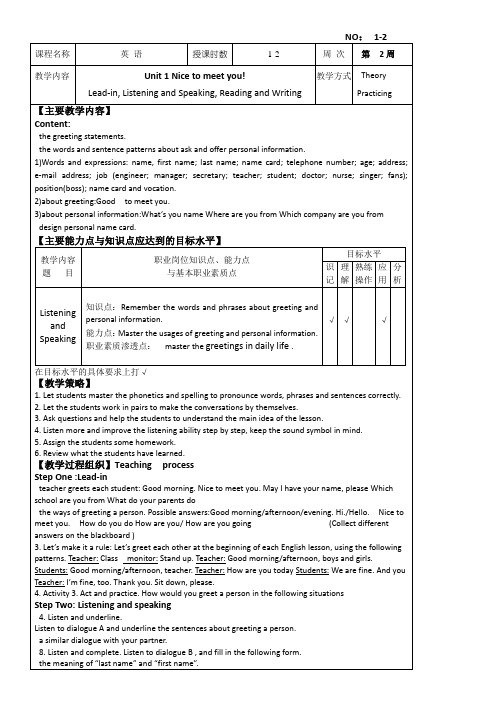
5. Assign the students some homework.
6. Review what the students have learned.
2)about greeting:Good to meet you.
3)about personal information:What’s you name Where are you from Which company are you from
designpersonalname card.
【主要能力点与知识点应达到的目标水平】
B:Good morning! I’m Lin Chunning. Lin is my last name and Chunning is my first name.
A:Nice to meet you. I’m from No. 7 Middle school. Where are you fromB:Nice to meet you, too. I’m from Middle school.
【小结】Step Three:Summary and Production
1.Make a short summary of what we’ve learned today.(1)key vocabulary.(2)everyday English about greetings and personal information.
NO:1-2
课程名称
英语
授课时数
1-2
中职英语基础模块1 UNIT1Unit1(Lesson1)
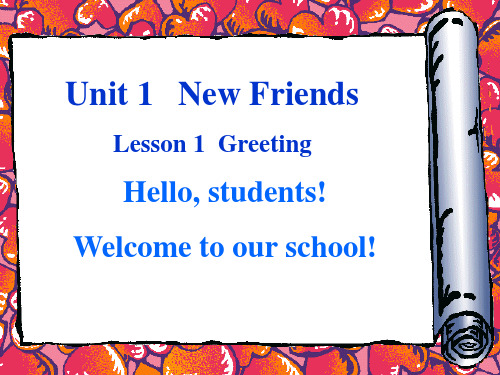
Dialogue B
• 1. Read and underline(问候句)
• 2. repeat the sentences
3.Try to get more sentences(问候)
• Glad to meet you • Nice to meet you • Pleased to meet you • Good to see you
• How do you do ?
4. Practice : ABAB型对话
A: … B: … A: … B: …
Tang Hua
Example
A: Hi! I’m XXX. B: Hi! I’m XXX A: Nice(Glad) to meet you./ How do you do?/
How are you?/ How are things? B: Nice(Glad) to meet you, too./ How do you do?
Unit 1 New Friends
Lesson 1 Greeting
Hello, students! Welcome to our school!
1. The teacher Introduces herself
2. and then asks some students to introduce
Assessment and reflection
1. I can say_____,_______,______,… 2. If I meet Sara Smith,I can say______or
______ 3. If I want to get more information I can
say_____,_______,__________, 4. I can introduce my friend_______________.
中职高教版英语1基础模块
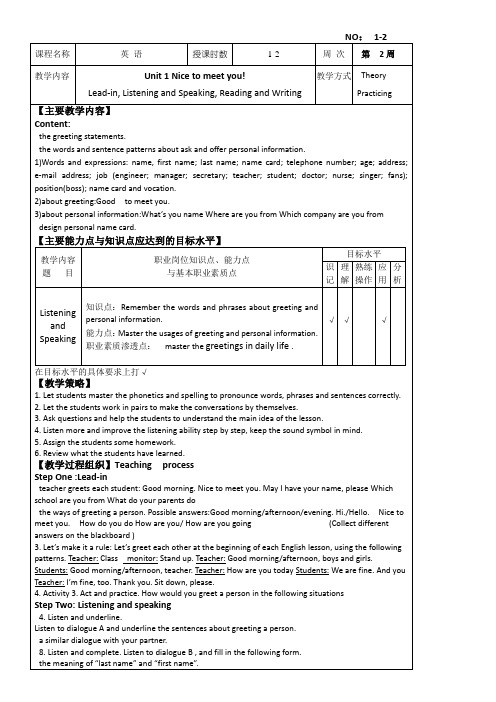
9. Read and underline. Practice the dialogue with your partner and underline the sentences aboutasking one’s personal information.
some students to design their name cards on the blackboard. Make some comments.
each student or each group a name card. Ask the students to talk about the information in the name card.
each student or each group a name card. Ask the students to talk about the information in the name card.
【作业及思考】Step Four:Homework
1. Practice dialogue B with your classmate after class.2. Make a similar dialogue, talking about personal information.3. Make an introduction of your classmate.4. Copykey vocabularyfive times in English ang one time in English.a special name card for yourself.
NO:1-2
课程名称
(完整版)中职英语基础模块unit1
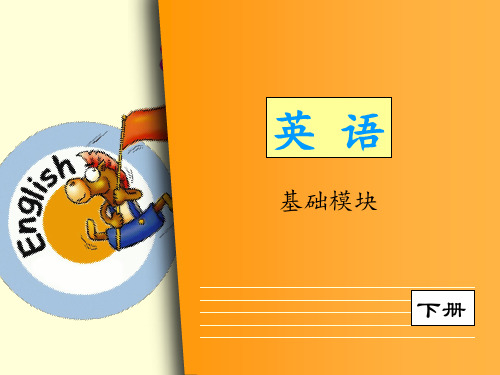
Section B Listening and Speaking
Warm-up
Dialo English Learning
Objectives
1. 能够辨别 /ɔː/ 和/aʊ/,/ɒ/和/əʊ/,/k/和/ɡ/,/j/和/dʒ/的 在句中发音的不同,并能正确掌握其发音。 2. 熟练掌握本单元出现的词汇、短语和句型,并能用 学过的短语、句型谈论英语学习。 3. 熟练掌握一般将来时态的用法。 4. 熟练掌握名片的基本写法。
Group 1 /ɔː/ and /aʊ/
Script (1)My uncle has a horse. (2)They shout at each other.
Group 2 /ɒ/and əʊ/
Script (1) That clock must be fast. (2) Tom wears a red coat today.
Warm-up Here are some sentences related to English learning. Please match them with the corresponding pictures.
5 Little Tom can’t remember new words he has learnt.
Activities
Warm-up Here are some sentences related to English learning. Please match them with the corresponding pictures.
中职英语 基础模块上册 Unit 1 Greetings warming up
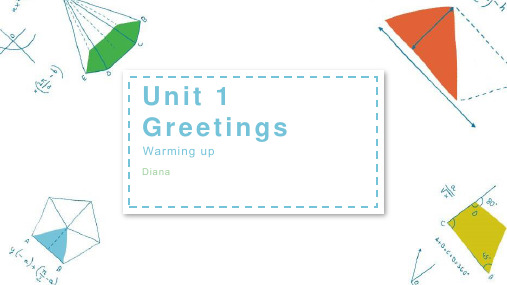
Thank you
Unit 1 Greetings
Warming up
Diana
Key word
• Greetings [ˈɡriːtɪŋz] 问候;打招呼;问候语 Eg:
发送贺卡 send greeting cards They exchanged greetings. 他们互相问候。 What are the general phrases used for greetings morning,day and evening? 早上、中午和傍晚,最常见的问候语是什么? (Answer)
0
Greetings 询问近况:最近过得怎么样?
How do you do?(正式) How are you?(礼貌) How is it going?(随意) How are you doing(随意) —— Pretty good. 过得非常好。 ——Fine,thank you. 很好,谢谢。 ——Not so well. 过得不太好。 What's up? (随意) —— Nothing much./ What's up.
0
Greetings
•
你是不是只会是不是只会回应I‘m fine.Thank you. And you?
• 那我猜“再见”你也只会说“Goodbye”喽?
0
Greetings 打招呼
Hello! Hi! Hey! Hi,there! 你好(不是特别熟悉的人) Good morning! Good afternoon! Good evening! Good night!
0
Greetings 回答问候
Pretty good. 过得非常好。 Fine,thank you. 很好,谢谢。 Not so well. 过得不太好。
中职英语基础模块上册 unit 1 greetings——welcome to our school
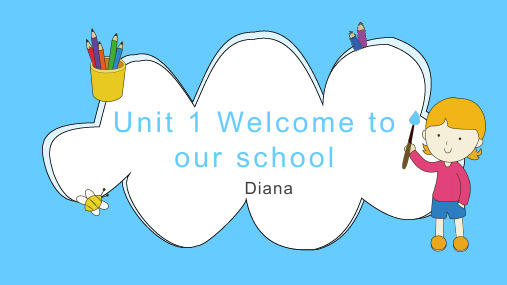
Homework 1.作业本上总结所讲的单词(单词+释义) 2.课本上P3选词填空。 3.背过所讲单词,下次课听写。
Thank you!
与学校相关的单词
• vocational [vəʊˈkeɪʃənl] adj.职业的 vocation[vəʊˈkeɪʃn] n.职业
Eg:欢迎来到
职业 教育 学校。
Welcome to
vocational education school.
与学校相关的单词
class班级,课节 • classroom 教室
与学校相关的单词
• dormitory [ˈdɔ:mitri] 宿舍? bedroom 卧室,寝室
•dining-hall ['daɪnɪŋh'ɔ:l]餐厅
•playgry basketball/football on the playground every day.
与学校相关的单词
chair 椅子 seat 座位 • library[ˈlaɪbrəri] 图书馆
Eg:图书馆里有很多书。 There are a lot of books in the library.
•reading room 阅览室 Eg:下课后,我们经常在阅览室里学习。 After class,we often study in the reading room.
• glad 高兴的 meet 遇见、汇合、迎接 nice 好的、令人愉快的
be glad to do 很高兴做... I'm glad to meet you. Nice to meet you.
• thank 感谢
thank...for... 为...而感谢... Thank you for your visit(参观)
- 1、下载文档前请自行甄别文档内容的完整性,平台不提供额外的编辑、内容补充、找答案等附加服务。
- 2、"仅部分预览"的文档,不可在线预览部分如存在完整性等问题,可反馈申请退款(可完整预览的文档不适用该条件!)。
- 3、如文档侵犯您的权益,请联系客服反馈,我们会尽快为您处理(人工客服工作时间:9:00-18:30)。
• D_e_p_e_n_d_smeeting someone for the first time
Introduction
• Americans have so many different ways of • greeting one another! In fact, many times an • American greeting will consist of several greeting • questions strung together. It is very common to • hear a friend say, “Hi, Jack. How are you doing? • Wow, I haven’t seen you how have you been?” all • in one breath.
•.
Warm-up
Look at the picture and tick. Emily and Jenny meet each other for the first time. Tick what they would say.
( ) 1. Hi, Jenny! ( ) 2. Good morning Jenny. Nice to meet you. ( ) 3. Hello, I’m Emily. ( ) 4. Bye. See you later. ( ) 5. How do you do? ( ) 6. Thank you!
Unit5、Food dolore magna aliqua. Ut
enim ad minim veniam, quis
nosUtrund eixter6cita、tionWeather
ullamco laboris nisi ut
aliquip ex ea commodo
Unit7、Computers Unit8、Brave It Out Unit9、Cultivation Unit10、Sports Unit11、Friendship Unit12、Festivals
Between Acquaintances [ə´kweıntəns ]
Hello. Hi. How are you? How are you doing? How’s it going? What’s up? What’s new? Hi, there
How are you?
• Good, pretty good, great, fantastic, perfect • Not bad • So so • Not good • Bad, I am not in a good mood • I am in a blue mood • Terrible, awful
Unit1、Greetings
Unit2、Family
Unit3、Campus Lorem ipsum dolor sit amet, Life
consectetur adipisicing elit,
Unit4、Time sed do eiusmod tempor
incididunt ut labore et
Key 1.√ 2.√ 3. 5.√
To greet people
The first time’s meeting
• How do you do? Nice to meet you. It’s a pleasure to meet/know you. Pleased to meet you. It’s good to know you. I’m glad to know you.
氏连用。在这种情况下,它可以单独使用,不必跟随姓氏。 • Ms.------对成人女性的婚姻状况不明或者回避时的礼貌称呼,与自己的姓
氏连用。如Ms. Zhang。
Formห้องสมุดไป่ตู้l or Informal?
• ___F___ speaking with a boss or manager at
work
• ___I___ talking to your brothers and sisters • ___F_t_im_ tealking to your teacher for the first
Reading: WeWlcaormiengtouOpur School NewRweoarddisngan&dWexriptirnegssions ListeninRge&adSipnegaking ListeGnainmge&CSepnetearking GGrraammmmaarr
hello! 你好
Hello ! 你好
Good morning!早上好 Good morning!早上好
常
常
见
见
问
问
候
候
语
语
Hello,What ’s your name?你叫什么名字?
Hi,my name is
地你好,我叫 色
how are you? 你好吗?
Fine, thanks ,and you? 我很好,谢谢
Saying good bye
• Bye • See you • See you later, see you around • Later (s) • So long • Take care
Cultural Notes:
The titles American use to address people: Mr. Mrs. Miss. And Ms. • Mr.--- 对成年男性的礼貌称呼,与姓氏连用。如Mr. Black。 • Mrs.---对已婚女子的礼貌称呼,与丈夫姓氏连用.如Mrs. Black。 • Miss.----对未婚女子的礼貌称呼。与该女士自己的姓
你呢
I'm fine,too.Tha
nk you! 我也是,谢谢
LOREM IPSUM DOLOR
Nice to meet you! 很高兴见到你 Nice to meet you,too! 也很高兴见到你
• Notes:
•
• 1. Introductions are important because a proper introduction will leave a good first impression upon others.
